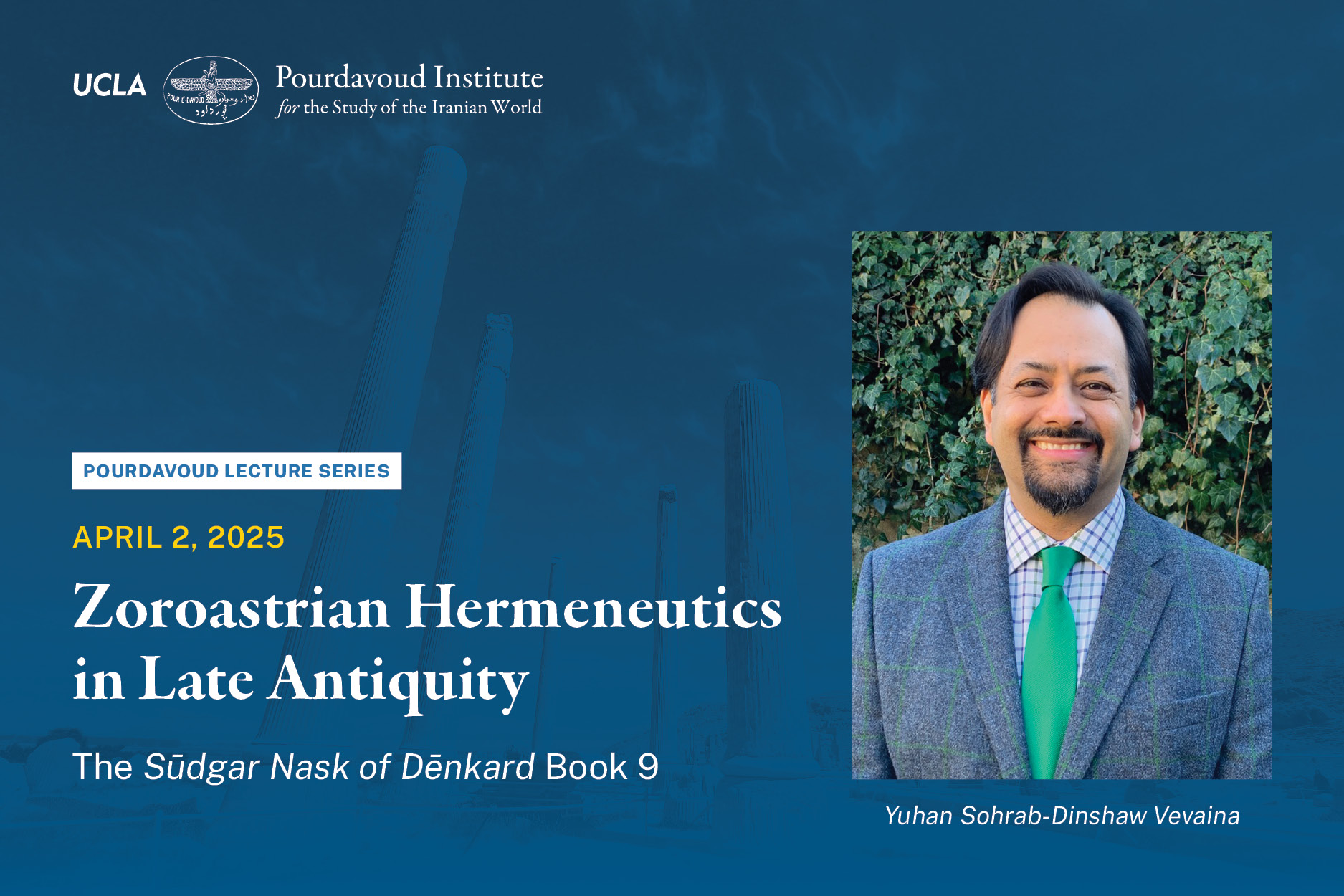

- This event has passed.
Pourdavoud Lecture Series: Yuhan Vevaina
Los Angeles, CA 90095 United States + Google Map

Zoroastrian Hermeneutics in Late Antiquity
 The Sūdgar Nask of Dēnkard Book 9 is a commentary on the ‘Old Avesta’ of the 2nd millennium BCE produced in Pahlavi (Zoroastrian Middle Persian) in the Sasanian (224–651 CE) and early Islamic centuries. This commentary is a value-laden, ideologically motivated discourse that displays a rich panoply of tradition-constituted forms of allegoresis. It mobilizes complex forms of citation, allusion, and intertextuality from the inherited Avestan world of myth and ritual in order to engage with and react to the profound changes occurring in Iranian society. Despite its value and importance for developing our nascent understanding of Zoroastrian hermeneutics and the self-conception of the Zoroastrian priesthood in Late Antiquity, this primary source has attracted scant scholarly attention due to the extreme difficulty of its subject matter and the lack of a reliable translation. This 2-volume work represents the first critical edition, translation, and commentary of this formidable text which will contribute to the philological, theological, and historiographical study of Zoroastrianism in a pivotal moment in its rich and illustrious history. Reading the Sūdgar Nask is a hermeneutic process of traversing texts, genres, and rituals in both the Avestan and Pahlavi corpora, thus activating nodes in a web or network of textual and meta-textual relations that establish new forms of allegoreses or meaning making. It is argued that this entire hermeneutical complex of weaving a ‘new’ text composed of implicit proof text and explicit commentary renews, extends, and, ultimately, makes tradition.
The Sūdgar Nask of Dēnkard Book 9 is a commentary on the ‘Old Avesta’ of the 2nd millennium BCE produced in Pahlavi (Zoroastrian Middle Persian) in the Sasanian (224–651 CE) and early Islamic centuries. This commentary is a value-laden, ideologically motivated discourse that displays a rich panoply of tradition-constituted forms of allegoresis. It mobilizes complex forms of citation, allusion, and intertextuality from the inherited Avestan world of myth and ritual in order to engage with and react to the profound changes occurring in Iranian society. Despite its value and importance for developing our nascent understanding of Zoroastrian hermeneutics and the self-conception of the Zoroastrian priesthood in Late Antiquity, this primary source has attracted scant scholarly attention due to the extreme difficulty of its subject matter and the lack of a reliable translation. This 2-volume work represents the first critical edition, translation, and commentary of this formidable text which will contribute to the philological, theological, and historiographical study of Zoroastrianism in a pivotal moment in its rich and illustrious history. Reading the Sūdgar Nask is a hermeneutic process of traversing texts, genres, and rituals in both the Avestan and Pahlavi corpora, thus activating nodes in a web or network of textual and meta-textual relations that establish new forms of allegoreses or meaning making. It is argued that this entire hermeneutical complex of weaving a ‘new’ text composed of implicit proof text and explicit commentary renews, extends, and, ultimately, makes tradition.
About the Speaker
 Yuhan Sohrab-Dinshaw Vevaina is the Bahari Associate Professor of Sasanian Studies and a Fellow of Wolfson College at the University of Oxford. He received his Ph.D. in Iranian and Persian Studies from Harvard University in 2007. Since then he has taught at Harvard University, Stanford University, and the University of Toronto prior to coming to Oxford in 2017. He is the co-editor with Michael Stausberg of The Wiley Blackwell Companion to Zoroastrianism. He is particularly interested in the interplay between apologetics, polemics, and historicising interpretations of the ancient Avestan scriptures by the Zoroastrian priesthood in the Sasanian and early Islamic periods. In 2023 and 2024 he published a two-volume book project of a critical edition and commentary on the ninth book of the Dēnkard with Harrassowitz Verlag, Wiesbaden. It was awarded the Association for Iranian Studies Book Prize for Best Book in Ancient Iranian Studies in 2024. He is currently preparing a manuscript entitled: Topographies of Rhetoric and Moral Reasoning in Sasanian and Post-Sasanian Zoroastrianism based on his four lectures at L’École Pratique des Hautes Études, Paris in Spring 2024, and he is also working on a co-authored critical edition of the Epistles of Manuščihr with Arash Zeini to be published by Edinburgh University Press.
Yuhan Sohrab-Dinshaw Vevaina is the Bahari Associate Professor of Sasanian Studies and a Fellow of Wolfson College at the University of Oxford. He received his Ph.D. in Iranian and Persian Studies from Harvard University in 2007. Since then he has taught at Harvard University, Stanford University, and the University of Toronto prior to coming to Oxford in 2017. He is the co-editor with Michael Stausberg of The Wiley Blackwell Companion to Zoroastrianism. He is particularly interested in the interplay between apologetics, polemics, and historicising interpretations of the ancient Avestan scriptures by the Zoroastrian priesthood in the Sasanian and early Islamic periods. In 2023 and 2024 he published a two-volume book project of a critical edition and commentary on the ninth book of the Dēnkard with Harrassowitz Verlag, Wiesbaden. It was awarded the Association for Iranian Studies Book Prize for Best Book in Ancient Iranian Studies in 2024. He is currently preparing a manuscript entitled: Topographies of Rhetoric and Moral Reasoning in Sasanian and Post-Sasanian Zoroastrianism based on his four lectures at L’École Pratique des Hautes Études, Paris in Spring 2024, and he is also working on a co-authored critical edition of the Epistles of Manuščihr with Arash Zeini to be published by Edinburgh University Press.

Pourdavoud Lecture Series - Yuhan Vevaina
